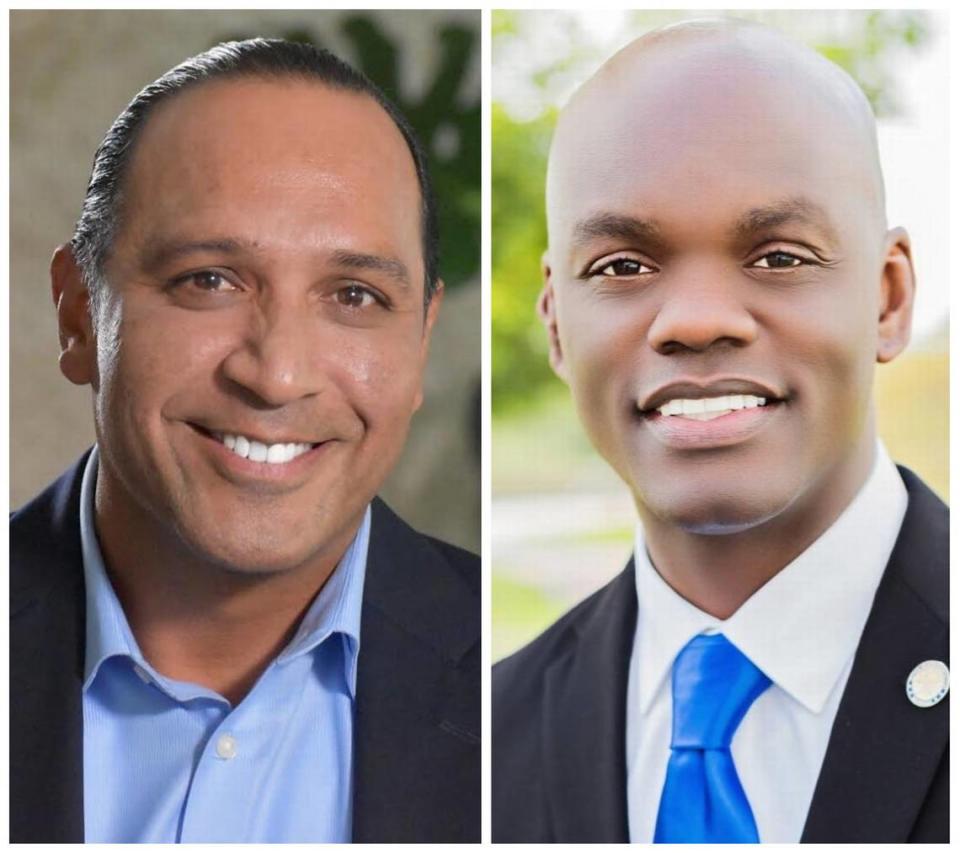Two candidates fighting to take the lead in District 9 as the Moss era ends
Term limits promise the end of an era in Miami-Dade’s District 9 when one of the two longest-serving county commissioners, Dennis Moss, finally gives up a seat he won while that area was still rebuilding from Hurricane Andrew.
Two candidates are running to succeed Moss, and start a new era for a district that’s a mix of farmland and suburban sprawl.
Kionne McGhee, a term-limited state representative and Democratic leader in Tallahassee, and Elvis Maldonado, an independent who spent 10 years on the Homestead City Council, finished first and second in the August primary for the non-partisan post. That earned them slots on the ballot for the fall runoff to decide District 9’s first new commissioner in 27 years.
“It’s a generational transition — it’s extraordinary,” said Marlon Hill, a Miami lawyer who finished a point behind Maldonado in the primary, missing out on the runoff by fewer than 300 votes. “It’s the first time the district will see new leadership in 27 years. That’s almost two generations of families. It’s a big deal in term of governance.“
The district includes some of the county’s poorest areas, with a poverty rate of about 24%, according to a 2018 report by the county’s Department of Regulatory and Economic Resources. That’s above the county poverty level of 20%, and makes District 9 the fourth poorest of the 13.
McGhee, 42, is running as the Moss heir, since the commissioner and current school board candidate endorsed him before the primary. “Moss made South Dade great,” said McGhee, a lawyer. “The next question is who can make South Dade unstoppable.”
Maldonado, 47, sees himself as a good fit for the district, as a small-business owner with experience in local government. “He’s clearly making it a partisan race,” Maldonado said of McGhee. “We’ll see how that turns out.”
Details on the candidates
The contest in a district where 53% of registered voters are now Hispanic could mean a change in the demographic mix of the 13-seat County Commission. Moss is one of four Black members. McGhee is Black, too, and Maldonado is Hispanic.
McGhee reported a net worth of about $92,000 in candidacy financial disclosures, with income of $90,000 from his McGhee Law Group and almost $30,000 from Florida for representing the 117th legislative district. McGhee listed about $415,000 in debt, a house and goods worth about $315,000, and a $180,000 valuation for his business.
Maldonado, who rents where he lives, reported a net worth of about $16,000, with about $29,000 in income from Homestead in 2019, his final year in office.
He received an additional $7,000 from a stake in an online nursery business he had started in Homestead. Maldonado said he has returned to information-technology consulting after that business ended.
Both candidates identified traffic, transit and police funding as priorities for voters in the district, which borders Monroe County and includes parts of Homestead, Florida City and the neighborhoods of Goulds and Perrine.
South Miami-Dade is on track to get the county’s first major transit expansion since Metrorail began airport service in 2012. The 20-mile rapid-transit bus system is scheduled to open in late 2022 or early 2023, a $368 million project commissioners approved for construction in a September vote.
The main fight came in 2018, when commissioners voted for the bus option — with customized vehicles allowing for group boarding and crossing arms giving the buses a straight shot through the county’s existing busway, which runs parallel to U.S. 1.
Moss and other leaders in South Miami-Dade pushed for a Metrorail extension that would have cost more than $1 billion.
Both candidates said they’d prefer some form of rail for the busway, but only McGhee said he would try to halt the rapid-transit bus project before construction could begin.
“We still have time to have a discussion,” he said. “Nothing has been built yet.”
Maldonado said his transportation priority will be easing traffic on the road network, including adding more lanes in particularly clogged areas. “We’re not matching infrastructure to the growth,” he said.
Maldonado said he wants the rapid-transit bus built before pursuing a light-rail system along the same route once Miami-Dade can afford it. “We’re looking anywhere from five to 10 years to break ground on that,” he said. “And we still don’t have the money for it.”
Police funding and general revenue
Maldonado said he’s been surprised how often “defunding the police” comes up as a concern from voters. “Believe it or not, that’s the No. 1 question,” he said. “People who live in a community want to feel safe,” he said.
If Miami-Dade faces a revenue shortfall in 2021, Maldonado said he’d insist on the county squeezing savings and efficiencies out of the budget before contemplating a higher tax rate to preserve police jobs.
“For me, efficiency is first and foremost,” he said. “Once I know we have tightened our belt and cut the budget as much as we can — when we’re there, then we can start looking at the second option. Which is increasing the millage rate to provide safety and security.”
McGhee said he wouldn’t consider a higher tax rate (known as “millage”) under any circumstances.
“No new taxes must be the mantra for all who plan to serve on the county commission,” he said.
McGhee agreed with Maldonado that residents want more police coverage, not less. “I can tell you based upon conversations in the community, with the crime rate ticking up... they are looking for an increased presence in law enforcement,” he said.



